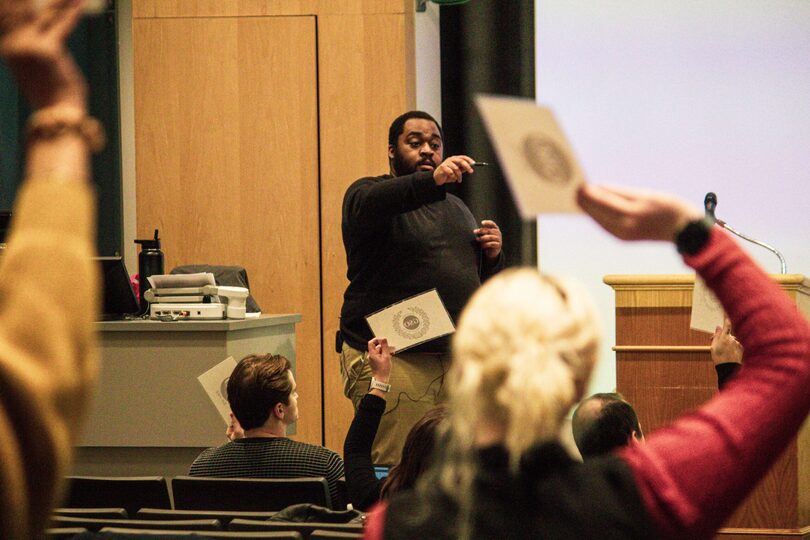Syracuse University deregisters GSO as 2025-26 officers begin terms

Syracuse University revoked recognition of the Graduate Student Organization as its new leaders began their terms. SU claims GSO's refusal to accept university oversight disqualifies it as a campus organization while GSO leaders argue they sought alliance, not separation. Brycen Pace | Senior Staff Photographer
Get the latest Syracuse news delivered right to your inbox.
Subscribe to our newsletter here.
After the 2025 spring semester concluded, Syracuse University’s Graduate Student Organization executive officers officially began their terms on June 2 for the 2025-26 academic year.
At 9:02 a.m., Graduate School Dean Peter Vanable sent an email informing the officers that the university would no longer recognize GSO as a registered student organization, which was communicated to the graduate student body a few minutes later.
“(Imagine) you’ve been hired to do a job, and at nine o’clock on your first day, you’ve been told that you’re fired,” said Roger Rosena, GSO president. “That is how abrupt the decision was.”
In April, GSO passed a resolution declaring independence from the university due to “increased administrative oversight,” cementing the organization as an “autonomous entity” at SU. In an email to GSO officers, obtained by The Daily Orange, Vanable wrote that SU cannot support the resolution’s terms and revoked GSO’s registered student organization status.
Without university recognition and access to the graduate student fee, GSO can’t continue in its current format, Rosena said.
“Given the GSO’s decision to operate independently, including its refusal to recognize the Graduate School Dean as their university-appointed advisor, the organization will no longer be considered a recognized student organization,” Vanable wrote in the email to graduate students, obtained by The D.O.
GSO Director of External Affairs Ethan Jackson said the university’s decision came with little warning.
In a Wednesday afternoon statement to The D.O. on behalf of both Vanable and the university, an SU spokesperson said that in an April 11 meeting between GSO officers and university leaders, SU “clearly communicated” that a move toward full independence would result in the organization losing institutional support.
“Despite that guidance, on April 30, the GSO proceeded with a declaration that disregarded the
requirements for University affiliation and adopted a resolution asserting ‘sovereign control’
over its governance and the graduate student activity fee,” the statement reads. “The actions taken by the GSO fundamentally departed from the expectations and requirements of recognized student organizations.”
The spokesperson added that GSO officers offered “no credible explanation” for why the organization should be allowed to operate differently than all RSOs and spend university funds “without oversight” from its SU advisor.
In March, GSO delivered a resolution to Vanable censuring him for an alleged abuse of power and unprofessional conduct. In its resolution, the organization moved to reject Vanable as its advisor.
In Vanable’s email to GSO officers, he wrote that the “explicit rejection” of SU oversight and advising, as well as its “unilateral assertion of control” of the graduate student fee, places GSO outside of the RSO framework.
He also wrote that the group would be excluded from using university resources, including office space, email and computer network access, funding and all other benefits “enjoyed” by SU-affiliated student organizations.
Following Vanable’s email, Rosena said he and other GSO officers attempted to communicate with Vanable and the SU administration, but did not receive a response until over a week later.
Their response, signed by Rosena, Jackson, GSO Vice President of Internal Affairs Joe Beckmann and GSO Comptroller Allison Hellman, asked that Vanable work with GSO as “equal collaborators.” According to their email, the intention was not to remove all university oversight from the organization.
In his response, obtained by The D.O., Vanable said GSO’s actions indicate otherwise and are incompatible with SU’s governance structure. He wrote that the university still plans to honor the previously approved registered graduate student organization funding amounts.
Other services funded by the graduate student fee, including the professional, academic and creative work grant, will not be interrupted.
The email’s subject line read “Final Clarification on GSO Status and Transition Process.” Vanable wrote that GSO’s actions suggest any further reconciliation attempts would be “futile.”
“We passed a budget, we elected officers, all with the assumption that we were going to continue,” Rosena said. “Then, when we first started, we got the email that they don’t want to have any relationship with us.”
The first section of GSO’s declaration distinguishes GSO as a “student government” entity, but not an RSO, and says it should not be subjected to regulations passed in the RSO handbook. The declaration later says GSO will retain full sovereign control over the graduate student activity fee, collected by the university.
The university spokesperson confirmed GSO was always recognized as an RSO.
The declaration also recognizes GSO as independent from the direct governance of the graduate school as well as its dean, administrators and staff. Instead, GSO would work alongside them as “partners for the common good.”
Rosena said GSO’s inability to choose its advisor, as well as losing the power to choose its Board of Trustees representative in 2023, largely contributed to passing the declaration.
“We have to be able to, at times, go against the administration …but don’t see the Dean as such as someone that we’re against,” Rosena said. “We do need the Dean to perform our job on behalf of advocating for students. We don’t need someone saying no to the things that we democratically voted on.”
Daniel Kimmel, a recent SU graduate and former GSO president, sent a letter on June 17 to SU Chancellor Kent Syverud, Vanable, the SU University Senate Agenda Committee and other members of SU administration requesting that Syverud suspend all actions taken against GSO.
Kimmel’s letter, obtained by The D.O., cites SU’s and the University Senate’s bylaws, which they wrote “implicitly” acknowledge GSO’s “special status” as a student government. Kimmel wrote that the Graduate School‘s actions are “illegitimate,” according to SU’s governing documents, as both bylaws recognize GSO by name and must be amended through formal actions.
Kimmel refers to SU’s bylaws, which names the presidents of the Student Government Association, GSO and the Student Bar Association as student members of USen.
“I firmly believe that the recent, unilateral administrative actions taken against GSO not only
circumvent all ‘orderly and prescribed’ procedures of shared governance, but also — harm instead of heal; undermine trust in the institution and the legitimacy of its policies and officials; and diminish the principles of shared governance that SU professes,” Kimmel wrote.
As of Wednesday, Kimmel has not received a response.
In Vanable’s initial email to GSO officers, he wrote that GSO’s recent resolutions contradict how SU monitors its use of funds.
“The organization’s independence conflicts with the University’s fiduciary oversight responsibilities and creates a governance issue that cannot be resolved through negotiations or a new GSO charter,” Vanable wrote.
Vanable copied Abby Perer, senior associate general counsel specializing in litigation and compliance for the university, on the email, alongside Lois Agnew, interim vice chancellor and provost, and Jerry Edmonds, SU’s chief of staff for academic affairs.
We passed a budget, we elected officers, all with the assumption that we were going to continue. Then, when we first started, we got the email that they don't want to have any relationship with us.Roger Rosena, GSO president
After the organization passed its declaration, Rosena and other GSO officers said GSO’s operations wouldn’t have significantly changed. The main change would be a strengthened and documented relationship with the university, Jackson said.
The declaration was not “set in stone,” Jackson said, and was intended to guide negotiations for a charter, or guarantee of rights and privileges, between GSO and SU. GSO’s resolution ratifying the declaration said previous issues with the administration could’ve been prevented with such a charter.
“I feel like the university is intentionally misreading this and trying to misrepresent this as the grad school, Syracuse as a whole, has to do exactly what we’re saying,” Jackson said. “And that’s not true.”
The university spokesperson said any claims that the declaration was a preliminary charter discussion “contradict” the language and intent of GSO’s approved resolutions.
“The terms outlined in the GSO’s resolutions and demanded repeatedly by GSO leaders cannot be accommodated through continued negotiations or a new GSO charter,” the spokesperson wrote.
Rosena and Hellman said before the June emails, officers hadn’t met or received any communication with Vanable since April. Their scheduled May monthly meeting with Vanable was canceled with no explanation, they said.
“From our angle, it seems that this was …very pre-planned on their end,” Hellman said. “With canceling the meetings and then sending an email on our first day of office, at nine in the morning, at the same time that they sent the email to the broader graduate school population.”
The university spokesperson told The D.O. that in the weeks before GSO voted to pass the declaration and reject Vanable as its advisor, then-President Kimmel canceled “at least” one meeting.
Although GSO has received support from graduate students, it will be difficult to communicate without access to the mass email listserv, Jackson said. In an email to the graduate student body, GSO officers included a Google form asking for questions or concerns regarding the situation.
In Vanable’s email to graduate students, he wrote that the university remains committed to supporting its students. The graduate student fee and other things previously managed by GSO will now be SU’s direct responsibility, the email states. He also said SU will work in collaboration with the Syracuse Graduate Employees Union.
Vanable wrote that SU has a responsibility to ensure all student activity fee funds are used transparently and in alignment with the university’s policies.
“The University cannot cede control of those fees or other University resources to an independent organization,” he wrote.
GSO was established in 1968 to promote and represent the interests of graduate students, the declaration states. In its early history, Hellman said the organization wasn’t formally part of the university.
Though GSO did important work, she said, its reach was limited. She and the rest of GSO’s executive team hope to reinstate the organization as a student government and work with SU to continue supporting graduate students.
“If we didn’t fight for this, this would be the end of the GSO, and we want to stop that, and we want to combat that,” Rosena said. “We are trying to advocate on behalf of the graduate students despite this challenge.”






